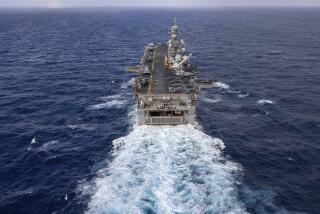Shultz Rejects U.N. Naval Force in Gulf
- Share via
WASHINGTON — Secretary of State George P. Shultz on Wednesday welcomed a Soviet agreement to begin work on methods of enforcing a U.N. cease-fire order in the Persian Gulf War, but he said that Moscow’s plan for a naval police force in the gulf is “entirely premature.”
Shultz said Soviet representatives at the United Nations are trying to link action on a U.S.-backed arms embargo against Iran to the formation of a mixed-nation gulf naval force. He made it clear that the United States will resist that plan.
“The Soviets have said they want to go ahead with a parallel effort at enforcement of the resolution,” Shultz said. “They apparently mean naval enforcement.”
Talking to reporters at a London press conference and later aboard his Air Force jetliner on the return flight to Washington, Shultz said the United States agrees that the U.N. Security Council must move aggressively to enforce its cease-fire order but that “a naval force doesn’t fill the bill.”
He said it is not clear whether Moscow envisions a peacekeeping force or a naval blockade. A peacekeeping force, he said, cannot work unless both sides agree to stop fighting, and a blockade--which might involve U.N. ships firing on blockade runners--would be too difficult an undertaking for the world organization.
“You can’t just talk about force in the abstract,” Shultz said.
“A peacekeeping force would be appropriate if both parties agree to abide by U.N. Resolution 598,” Shultz said, referring to the Security Council’s order last July for a cease-fire in the seven-year-old war. Iraq has accepted the resolution, but Iran has balked.
“If the concept is a blockade,” he said, “you have to have a land blockade as well as a naval blockade,” because weapons could be shipped to Iran by overland routes.
Shultz declined to speculate about Soviet motives, but a senior Administration official said Moscow apparently is stalling. The Soviets have tried to maintain cordial relations with both Iran and Iraq, and the official said Moscow apparently does not want to be forced to vote on an arms embargo against Iran.
Switching the Onus
The Soviet plan could be intended to switch the onus to the United States for blocking effective U.N. action.
The Iran-Iraq War was discussed during last week’s summit meeting between President Reagan and Soviet leader Mikhail S. Gorbachev. Shultz said he sensed at that time that Moscow was preparing a new move, but the details were not spelled out until Tuesday, when Moscow’s U.N. representative presented the plan during consultations among the five permanent members of the Security Council.
The United States has been pressing Moscow since last September to agree to a new U.N. Security Council resolution imposing an arms embargo on Iran for its defiance of the cease-fire order. Soviet Foreign Minister Eduard A. Shevardnadze proposed a U.N. naval force last September, but Moscow had not previously made a formal link between the two issues.
The United States has about 40 warships in the Persian Gulf region protecting U.S.-flag ships, most of them Kuwaiti-owned. The Soviet Union has a much smaller naval presence to escort a smaller number of Soviet-registered freighters.
Shultz also ruled out extending the protection of U.S. warships to merchant ships flying other flags.
Shultz was in London for talks with Prime Minister Margaret Thatcher and Foreign Secretary Geoffrey Howe at the end of a post-summit tour of Europe.
Shultz gave tacit approval to a pet project of the Thatcher government--development of a joint British-French air-launched cruise missile with a range of less than 300 miles. The weapon is intended to fill in some of the gaps in the West’s nuclear deterrent left by the new U.S.-Soviet treaty on intermediate nuclear forces (INF), which bans medium-range nuclear weapons.
More to Read
Sign up for Essential California
The most important California stories and recommendations in your inbox every morning.
You may occasionally receive promotional content from the Los Angeles Times.













